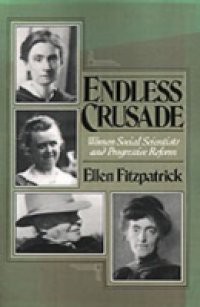This book examines the lives and careers of four American women--Sophonisba Breckinridge, Edith Abbott, Katharine Bement Davis, and Frances Kellor--who played decisive roles in early twentieth-century reform crusades. Breckinridge and Abbott used their educations in political science and political economy to expose the tragic conditions endured by the urban poor. Davis became the first superintendent of the New York State Reformatory at Bedford Hills and was a leading figure in prison reform. Kellor's sociological training gained her admittance to the smoke-filled rooms of national party politics and eventually to a high-ranking position in the Progressive Party. In Endless Crusade, Fitzpatrick follows these four women from their collective experience as University of Chicago graduate students at the turn of the century to their extraordinary careers as early-twentieth-century social activists, exploring the impact of their academic training and their experiences as professional women on issues ranging from prison reform to Progressive Party politics. Fitzpatrick examines how each woman struggled, in various settings, to promote effective social reform. Their shared commitment to social knowledge and social change, she shows, helped to shape the character of early-twentieth-century reform.

